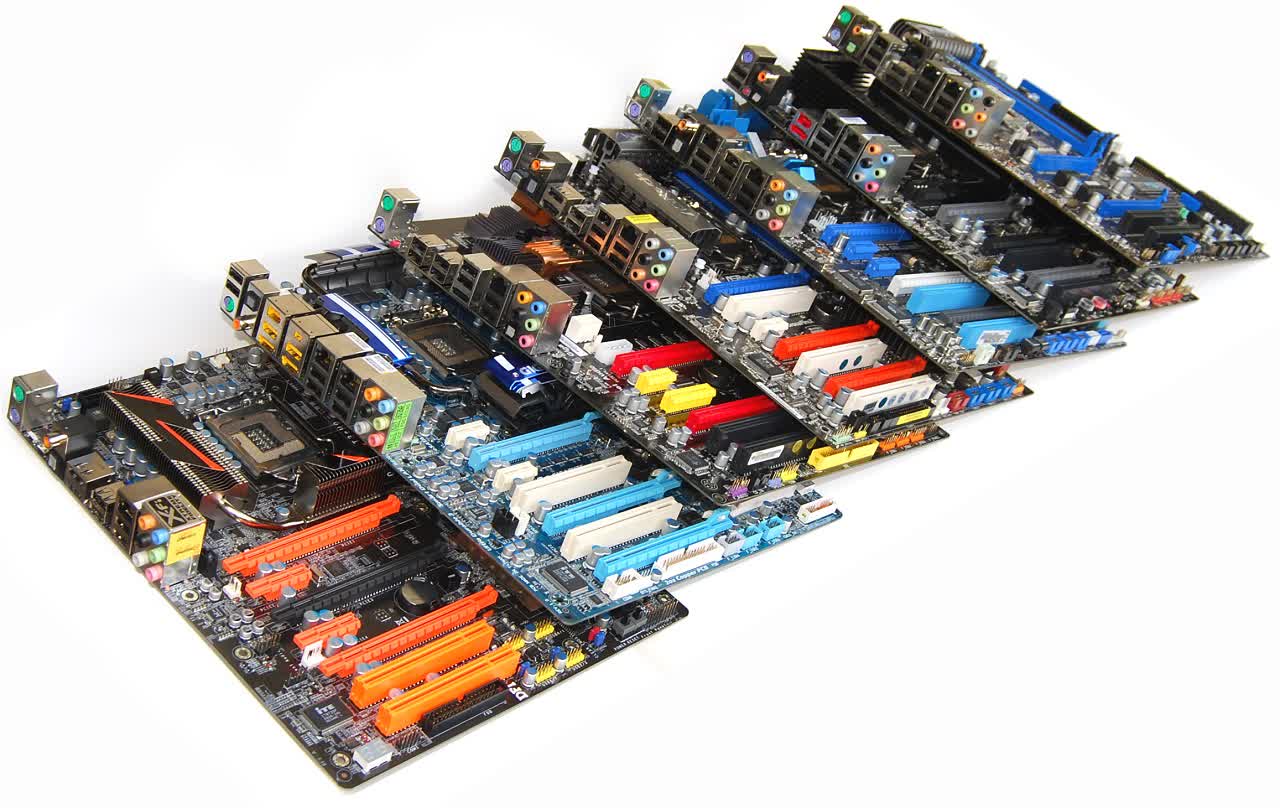Wrapping Things Up
The last time we published a motherboard round-up was 2 years ago, when we looked at nine Intel P35 motherboards. Not a lot has changed since then. While the P55 motherboards of today are very different in terms of design, features, and performance, a few things remain very much the same.
As we found back then, it doesn't really matter if you are spending $120 or $250 on a P55 motherboard, they are all going to deliver about the same level of performance whether you work or play. Even the boards' overclocking abilities were similar with the ECS P55H-A being the only exception.
Still those looking to build an affordable Core i5 system with the ECS P55H-A, won't be turning their noses up at a 3.80GHz overclock. Placing the ECS P55H-A aside for a moment, the remaining six motherboards all produced overclocks between 4000MHz and 4200MHz. The Asrock P55 Extreme easily delivered the best bang for your buck here, as this $140 motherboard reached an impressive frequency of 4189MHz.
If we are going to award the Asrock P55 Extreme with the title of the best bang for your buck overclocker, the Asus P7P55D Deluxe was hands down the most user friendly in this respect. We are not talking about dodgy software or auto-overclocking features, rather the Asus P7P55D Deluxe was the easiest motherboard to overclock using the old fashioned BIOS settings.
In order to reach our maxing 4.2GHz we selected a base clock frequency of 200MHz, lowered the memory frequency to 1600MHz and then hit save & exit. The Asus P7P55D Deluxe was able to adjust the vcore as it saw fit and we were rewarded with a 100% stable overclock. For its extremely simple ease of use the Asus P7P55D Deluxe quickly became our favorite motherboard to overclock the Core i5 750 processor with.
Moving on to other prominent matters, we have the motherboards' feature sets. Of course, features must come at a price, so we had the delicate job of weighing up features against the overall cost of the motherboard.
Starting with the most inexpensive model, the ECS P55H-A at just $120 is one of the most affordable ways to get on the LGA1156 bandwagon, but is it the smartest way? Honestly we think not as the Asrock P55 Extreme provides a significantly better product for $20 extra. The board's 8 + 2 power phase design seemed better equipped for overclocking and perhaps had a hand in keeping the Core i5 CPU cooler.
Still for those not interested in overclocking, the Asrock P55 Extreme offers better expansion options, better connectivity with Firewire support and a much cooler looking board design. On the flip side, if none of this bothers you then the ECS P55H-A still remains a slightly cheaper way to get your hands on some LGA1156 hardware.
The MSI P55-GD65 also strikes us as a great value at $160, and it felt like a significant step up again. The P55-GD65 offers an extra SATA port when compared to the ECS and Asrock boards, while there is also an additional Gigabit LAN controller present.
Moving further up the food chain we have the DFI LanParty DK P55-T3eH9 and we have to say while this motherboard certainly looks very cool, at $190, it's probably not the coolest option. Despite its lackluster overclocking results, we didn't find the LanParty to be heavy on features boasting just one more SATA port compared to the MSI P55-GD65, yet it drops the second Gigabit LAN controller.
Jumping across the $200 price barrier we are left with the Asus, EVGA and Gigabyte boards. The Asus P7P55D Deluxe won us over with its impressive overclocking abilities, but in terms of features the wow factor is not exactly there. Yes, it has the 16 + 3 power phase design, but what that means to you is what exactly? In total there are nine SATA ports matching those of the DFI board, while Firewire support is present along with dual Gigabit LAN. The LAN support was disappointing as Asus lost their head for a moment and picked an old PCI controller. While in their moment of confusion, they also went with an old PCI Firewire controller, which they likely picked out of the VIA discount bin, not something you want to do with your 'Deluxe' models. Asus tried to redeem themselves with the VIA VT2020 10-channel audio codec.
Overall the quality of the Asus motherboard is good and with the exception of a few flack old PCI-based controllers, the components are of high quality. Not to forget though, when all is said and done for $60 more than the MSI board you just get one extra SATA port and two extra audio channels that you many never use.
The EVGA P55 FTW is another motherboard that is hard to justify purchasing based on features alone. Although it is an excellent quality product like the Asus P7P55D Deluxe, it offers nothing more than the MSI P55-GD65 for $60 more. We did like the package associated with the P55 FTW as it has some cool features that will excite hardcore enthusiasts.
The most expensive and well equipped motherboard was the Gigabyte P55-UD6 at $250. There is no messing around with this one as you get a total of twelve SATA ports, six DIMM slots and a crazy 24 + 3 power phase design. Everything else remains much the same, so you have to decide if the extra SATA ports and DIMM slots serve you any purpose. The P55-UD6 was an excellent ambassador for the Gigabyte P55 series as it managed all tasks really well.
While today we tested just seven P55 motherboards, we were actually looking at around seven product series. Motherboard manufacturers rarely redesign a motherboard from scratch. Once they have come up with the formula for a particular platform, they generally stick with it. From experience we can tell you that the entire Asus P7P55D family provides the same effortless high-performance overclocks.
To date I have overclocked a number of Core i5 750 processors on a range of Asus P55 motherboards, including the P7P55D, P7P55D Pro, P7P55D Evo and P7P55D Deluxe. These range from $150 through to $220 and in terms of overclocking they are all the same.

Best budget motherboards: Asrock P55 Extreme, MSI P55-GD65
Best overclocking motherboard: Asus P7P55D Deluxe
Best enthusiast-level motherboards: Asus P7P55D Deluxe, EVGA P55 FTW
Keeping all this in mind we are going to narrow it down to you based on our extensive weeks of testing and experimentation. Although ECS provided us with the most affordable product, we are going to award the Asrock P55 Extreme as our best value P55 motherboard.
Budget aside if I were to have my pick of a P55 motherboard it would be the Asus P7P55D Deluxe as this feels like a quality product that provides headache free overclocking.
The MSI P55-GD65 was a very close second as it's not only a great overclocker that offers loads of features at an excellent price, but it was also our most power efficient P55 motherboard.
Overall we have found that there are plenty of good P55 solutions out there, and we hope to have helped you make a more informed buying decision.
